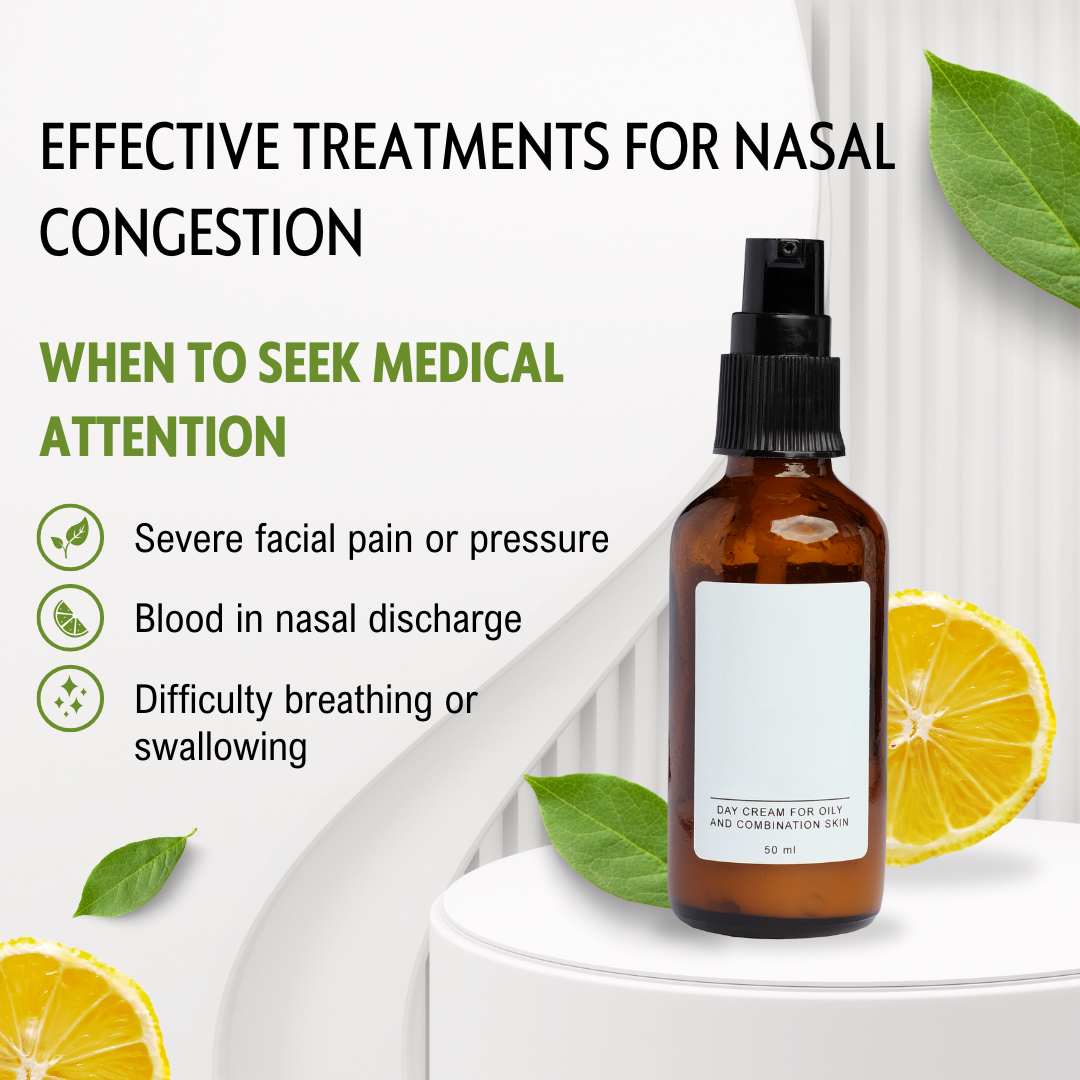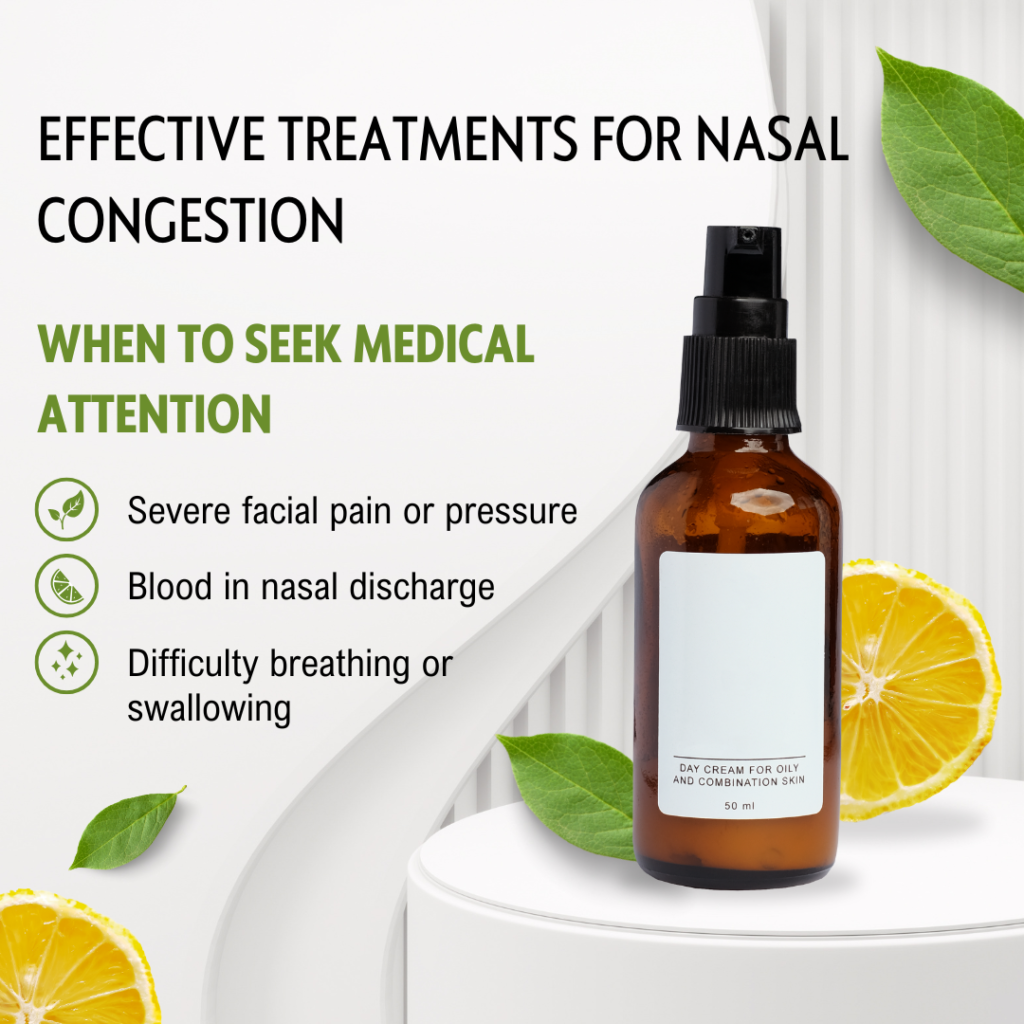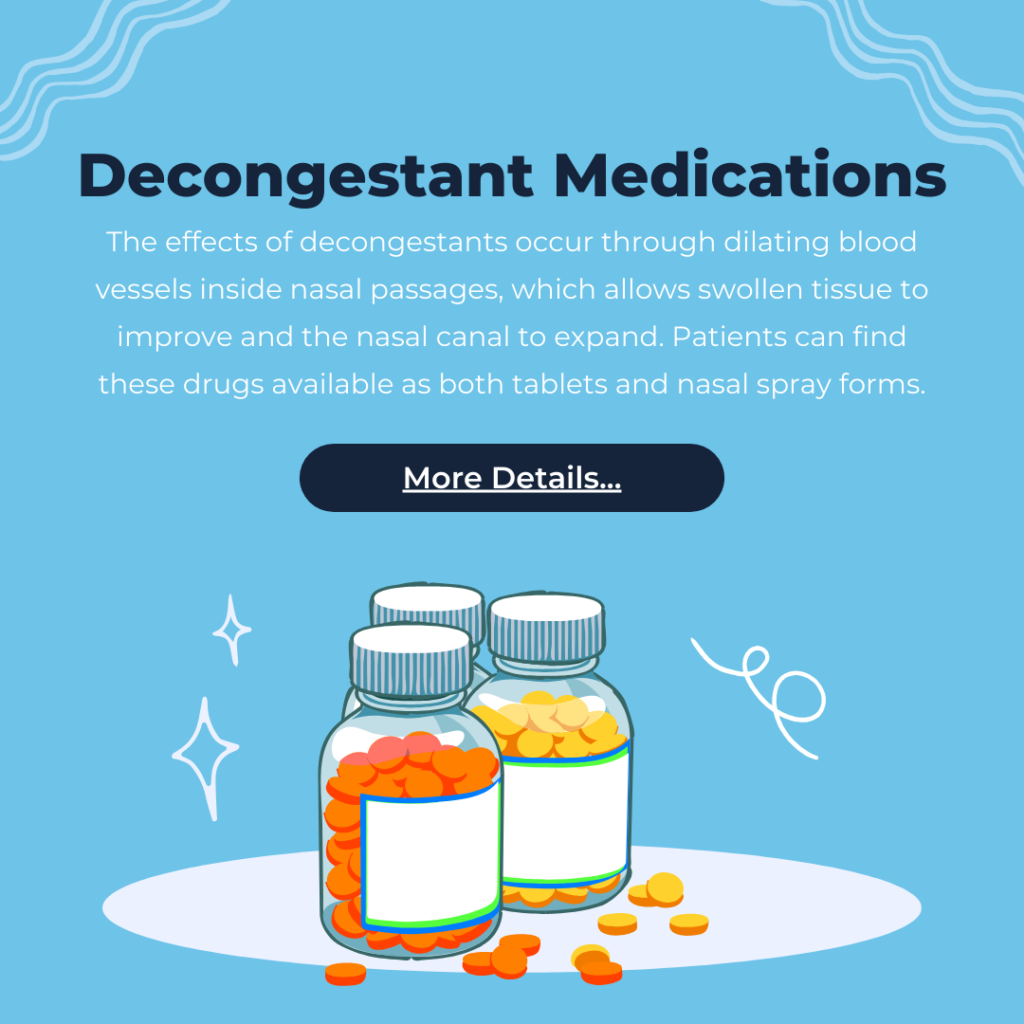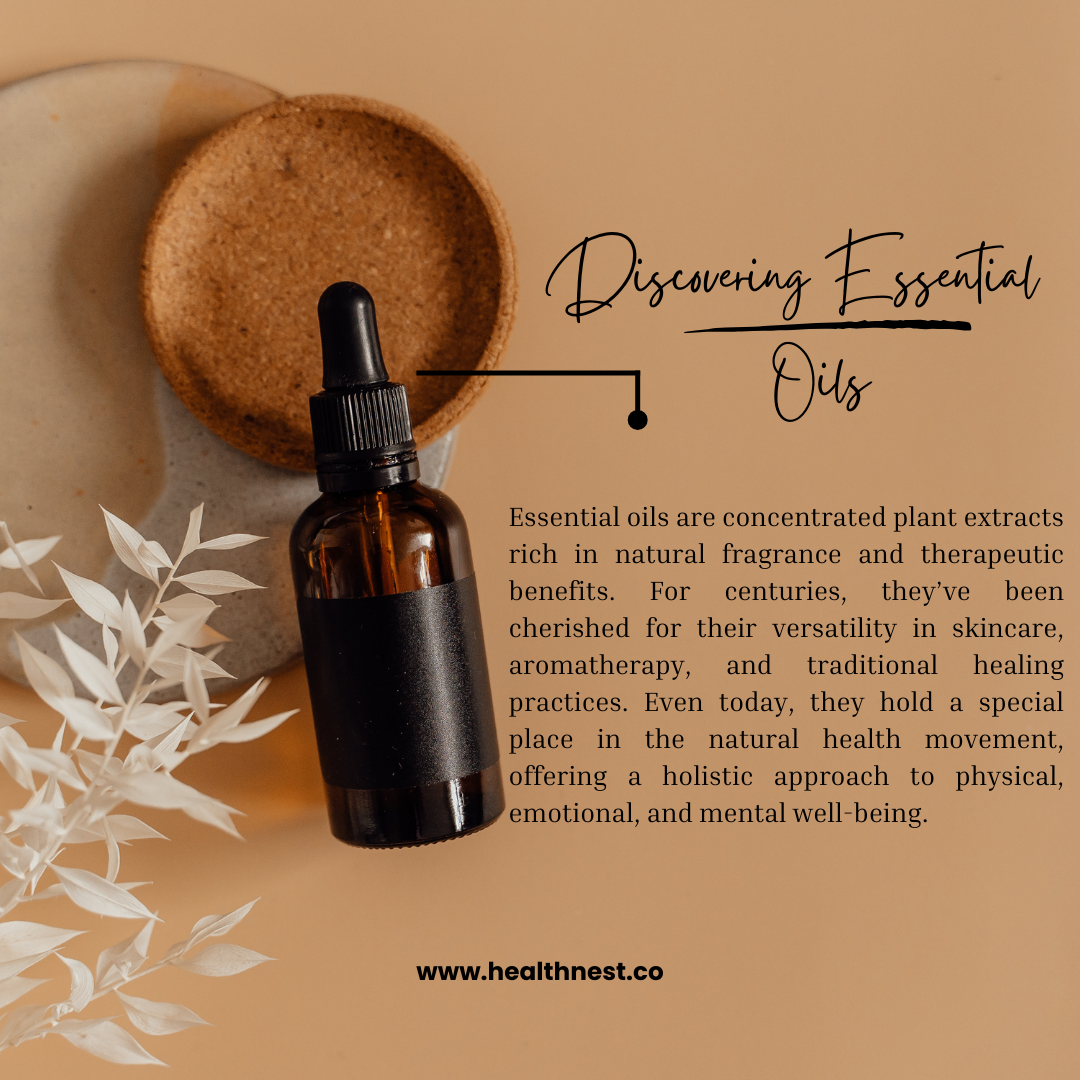Effective Treatments for Nasal Congestion

Patients experience nasal congestion, which medical professionals call “stuffy nose” because the nasal tissue becomes both blocked and inflamed, thus preventing comfortable breathing through the nose. Nasal closure results from different causes, such as illness or infection or allergies or exposing the nose to unfavorable environmental substances. Nasal congestion creates multiple symptoms, including stuffy nasal passageways and sinus pressure, alongside post-nasal drip, which results in whole-body distress and life-quality reduction.
Blocks in your nasal passages create discomfort, yet you have multiple techniques that work effectively to open such congestion. This extensive guide explores multiple treatment strategies that reduce nasal congestion, including simple homemade solutions alongside medications available over-the-counter.

Understanding Nasal Congestion
Blood vessels in nasal passages swell into congested inflammation from viral infections, atmospheric microbes, as well as airborne allergens. Restricted airflow occurs when blocked nasal passages block the flow of air. As a result, mucus builds up in the sinuses. The obstructing nasal block restricts nose breathing while leading to facial discomfort along with pressure and headaches.
Nasal congestion can be caused by a variety of factors, including:
- Colds and Viruses: The common cold ranks among the leading nasal congestion triggers. Infectious agents activate nasal inflammation, which causes nasal tissues to swell while resulting in abnormally high mucus production.
- Sinus Infections: Chronic nasal congestion often stems from conditions where the sinuses become inflamed, still known as sinusitis. An infected sinus produces mucus that builds up inside the nasal cavities.
- Allergies: Nasal congestion can result from allergies that develop when the body reacts to pollen, dust, pet dander, and mold. Allergen exposure activates the immune system, which releases histamine to cause nasal passage inflammation.
- Environmental Irritants: Congestion of the nasal passages occurs when smoke, strong perfumes, pollution, and changes in temperature act as triggers to irritate the nasal membranes.
By understanding what causes your nasal congestion, you will select the best possible treatment method. The variety of causes for congestion due to colds, sinus infections, or allergies can be treated through various effective methods for symptom relief.
Natural Remedies for Nasal Congestion
Numerous adults first seek out natural treatment methods for their congestion rather than turning to medication. Natural congestion treatments prove effective for providing relief while avoiding the unwanted side effects that occur from drug administration. Professional management of blocked noses includes these reliable approaches.
1. Steam Inhalation
Steam inhalation stands as one of the most used and successful ways to alleviate nasal congestion disorders. The moist heat from steam safely lubricates dry nasal airways while breaking up mucus and calming swollen nasal tissue. Nasal steam therapy works best when individuals face congestion from colds or sinus infections.
To perform steam inhalation:
- Put a large bowl underneath hot water.
- Steaming your face while covered with a towel traps the condensation to maximize the treatment effects.
- Inhale deeply through your nose while keeping your eyes shut for multiple minutes.
Warm showers serve as an equally effective alternative to steam therapy for similar results. Breathing the warm, moist air produces two benefits: it clears nasal passages while soothing sinus tissue and promoting easier breathing.
2. Humidifiers and Vaporizers
Your home air quality will experience significant improvement through the use of humidifiers and vaporizers, which help treat nasal congestion. These air devices add moisture that stops nasal passages from drying, which reduces inflammation-related irritation. During dry weather conditions, including winter months, humidifiers offer maximum benefit to indoor air quality.
A humidified environment helps stop mucus from getting thick and sticky that could block nasal airways. Regular cleaning of your humidifier remains fundamental because it stops bacterial growth or mold development, which intensifies congestion symptoms.
3. Hydration
Hydration works as a treatment to decrease nasal congestion. Drinking enough fluids can help break up nasal mucus so your body can easily flush it out through your passages. The method helps relieve sinus-specific pressure and makes your nose feel less full.
Warm fluids serve dual functions because they soothe the body and nasal passageways by their application. Consuming herbal teas containing ginger, peppermint, or chamomile lowers inflammatory response in addition to providing soothing comfort.
4. Warm Compresses
Warming up your face with a compress will promote better sinus drainage so you get relief from pressure together with reduced nasal stuffiness. A compress heated for therapeutic use opens nasal pathways and enhances blood flow, thereby calming inflammation. The application of a warm compress helps reduce both sinus pressure and the painful feelings due to blocked sinuses.
To apply a warm compress:
- Use a clean towel to absorb warm water while still draining the excess fluid.
- Position your towel across your nose and forehead and your sinuses for 10 to 15 minutes.
- Perform this process multiple times throughout your day.
Warm compress treatment delivers benefits to specific situations where chronic sinus congestion or facial pressure persists.
5. Saline Nasal Sprays and Rinses
Individuals battling nasal congestion should use nasal sprays that contain saline or neti pot devices that help clear mucus and allergens from their nasal cavities. Saline-based nasal products deploy a water and salt mixture to wash away mucus as well as airborne allergens together with external irritants from nasal cavity passageways. These products reduce congestion quickly while helping to preserve your nasal hygiene conditions.
Users can easily acquire over-the-counter saline sprays, which they find in consumer pharmacies. Tilt your head, then insert the saline spray into your nostril before the liquid exits through the opposite opening. Used in combination with a neti pot, you can fully clean both nasal passages.
6. Spicy Foods
Hot foods work as short-term congestion relief because they break down mucus while allowing nasal pathways to open up. Nasal congestion benefits from decongestant ingredients like capsaicin, which exists in chili peppers. When you eat spicy foods, they might briefly trigger nasal drainage, but the effects will lead to better sinus functionality and congestion relief.
Among the common range of spicy foods, you can use hot peppers alongside horseradish and wasabi, together with spicy soups or curries, for congested noses. Monitor your tolerance to hot foods, as digestive issues may hinder you from fully enjoying them.
Pharmaceutical Treatments for Nasal Congestion
Nasal congestion symptomatic relief can be found from both natural remedies and over-the-counter drugs. You should evaluate pharmaceutical medication options when your symptoms fail to improve or the natural treatments do not bring sufficient benefit.
1. Decongestant Medications
The effects of decongestants occur through dilating blood vessels inside nasal passages, which allows swollen tissue to improve and the nasal canal to expand. Patients can find these drugs available as both tablets and nasal spray forms.
- Oral Decongestants: Patients can receive nasal congestion relief through common medication pseudoephedrine, which is also known as Sudafed. Decongestant medications work by narrowing blood vessels in your nasal passages, thereby reducing swelling and resulting in better airflow.
- Nasal Sprays: Nasal decongestant sprays that contain oxymetazoline (Afrin) work to hook blood vessel constrictions inside the nasal passages, thereby providing fast relief. Using nasal sprays beyond three consecutive days creates the risk for developing “rebound congestion.”

2. Antihistamines
Nasal congestion from allergens can benefit from antihistamine treatments that decrease symptom effects. Recent medical studies show that antihistamines prevent histamine activity, which produces nasal passage swelling and inflammation.
People can use oral antihistamines together with nasal spray applications to receive targeted relief. Due to their sedative effect, select antihistamines require non-drowsy formulation for users who need daytime alertness.
3. Steroid Nasal Sprays
When dealing with long-lasting nasal congestion, physician-prescribed steroid nasal sprays often yield strong therapeutic results. Consisting of anti-inflammatory ingredients, these sprays enable decreased nasal swelling, which helps stop congestion. A pharmacologist can provide you with steroid nasal sprays available with commercial prices and prescription rates for different strength options.
People must use steroid nasal sprays precisely according to manufacturer directions to minimize adverse reactions. These nose sprays typically need a few days to start working but deliver extended help against seasonal allergies as well as sinus blockages.
When to Seek Medical Attention
Most nasal congestion issues can receive home-based care, yet you need medical evaluation for particular situations. If your congestion is accompanied by the following symptoms, it may be a sign of a more serious condition:
- Severe facial pain or pressure
- High-fever which lasts for more than 48 hours
- Blood in nasal discharge
- Bilateral nasal congestion persists after ten days without any sign of recovery.
- Difficulty breathing or swallowing
Consult a healthcare professional for medical evaluation when either the origin of your nasal congestion remains unclear or your symptoms do not improve with previous treatment.
Conclusion
Cases of nasal congestion occur frequently while presenting frustrating symptoms, yet proper treatments help to minimize them. A blocked nose can be treated effectively through natural steam options as well as over-the-counter medications because you have many options to choose from between natural remedies and OTC comfort solutions for unblocking nasal passages and improving breathing. People should consult doctors if respiratory symptoms either linger or become worse because they need medical treatment for existing health issues. These treatments help patients relieve nasal congestion while also enhancing their total quality of living.



